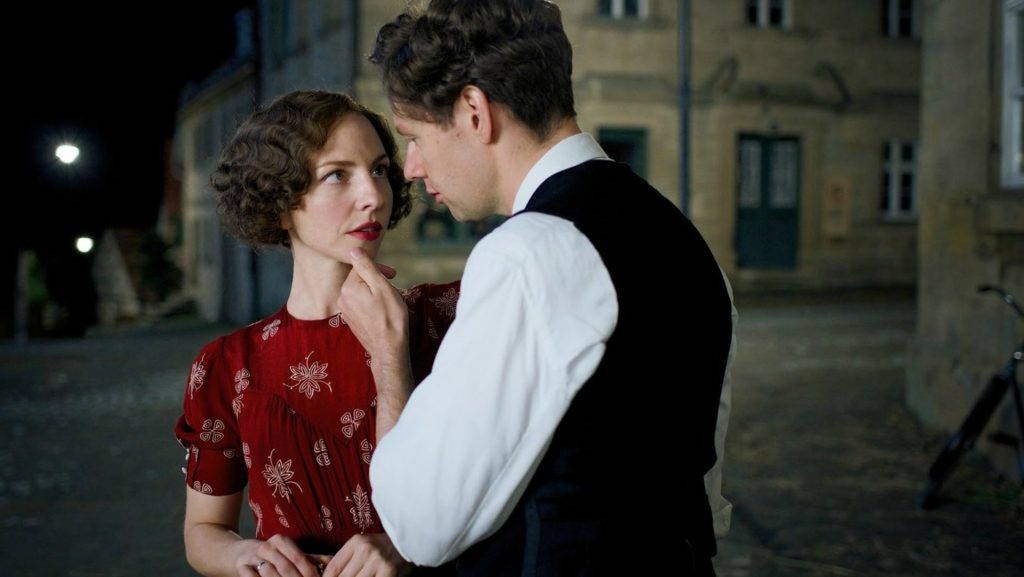
13 MINUTES (Elser)
Sony Pictures Classics
Reviewed by: Harvey Karten, Shockya
Grade: B+
Director: Oliver Hirschbiegel
Written by: Fred Breinersdorfer, Leonie-Claire Breinersdorfer
Cast: Christian Friedel, Hatharina Schuettler, Burghart Klaussner, Johann von Buelow
Screened at: Sony, NYC, 2/15/17
Opens: March 17, 2017
Here’s a question that you might ask to test the courage and ethical values of a person. If you had could see the future back in 1900 when Hitler was still an apolitical young man, would you have killed him if you had the chance? Remember: that since you are the only person to see far ahead and you would be treated as a common killer. You would be an unrecognized hero as the war would not have taken place, and you would be serving a life term for a crime that nobody could understand.
Something similar happens in 1939, though conditions were different. Europe is on the brink of war because of provocations of one man, who holds most of his Germany mesmerized by his oratory. Were it not for Hitler, World War 2 might have been averted and 55 million people would have been saved. Therefore, assassinating this ruthless tyrant, the most evil person of the century, would be a noble task. Would anyone step forward to do the deed? One man did, though he thought he could get away with the murder. Though a Communist sympathizer living in a small town in the Swabian Jura, he acted alone. The fellow was “Georgie” Elser, quite the ladies’ man, a handsome fellow, even better looking than the comely Christian Friedel who portrays him and can be found in virtually every frame. He could be defined as a free spirit, one who believes in individual freedom and keeping the government out of the business of planning and executing senseless wars.
Oliver Hirschbiegel, who directs, and whose stunning 2004 film “Downfall” describes Hitler’s final day in his bunker, brings Fred Breinersdorfer and Leonie-Claire Breinersdorfer’s screenplay to life, setting the suspenseful tone without delay. A sweating, grunting, Elser (Christian Friedel), working alone with dynamite that he assembled and places just below a Munich speakers’ platform, is timed to go off during Hitler’s address to a crowd of supporters. The timer works, but the explosion comes thirteen minutes after Der Führer had already left the town hall. Elser seeks to flee to Switzerland, but is arrested by suspicious soldiers and stupidly has incriminating evidence on his person. The rest of the film switches regularly to his happier days in town where the women had eyes on him, and to an unhappy time when he is interrogated by the Gestapo and others in the German high command who firmly believe that the assassination attempt was planned by a group.
While Elser’s only enemy before 1939 might have been Erich (Rüdiger Klink), the abusive, drunken husband of George’s main squeeze Else Härlen (Katharina Schüttler), he fares badly after his arrest, subjected to “enhanced interrogation techniques.” Lying flat on some springs with a vomit basin beneath his mouth while repeatedly asked by head of criminal police Arthur Nebe (Burghart Klaussner) and Gestapo chief Heinrich Müller (Johann von Bülow) for his name and date of birth, he answers with silence and is met with a severe whipping that led to his throwing up right into the basin. But when his family is threatened, he relates how he got the explosives and continues to insist that he worked alone. Punishments increase incrementally under the orders of the SS Obergruppenführer (Simon Licht), who demands that the prisoner name his accomplices.
It’s intriguing to watch the ambience of Elser’s small-town Koenigsbronn (which lies on the tourist belt now). The town is at first a zone for Communist activities, then shifts to an alliance with the Nazis, the youths harassing Elser’s family for being church-going Christians. If you want to know how a town like this could support the National Socialists, look simply at these small-fry, proud in their uniforms as Hitler Youth, with bright, swastika banners virtually proclaiming that Hitler would transform his country into paradise.
There are sentimental scenes in the film. One shows that the secretary (Lissy Pernthaler) typing notes develops sympathy for the hapless prisoner, agreeing to do him a favor. Even one of the Nazis questioning Elser—who is considered too soft by his colleague—ends up collaborating later in an assassination attempt against Hitler.
One of the cinematic pleasures is a scene in which Elser is given an injection of truth serum, which serves only to make the prisoner hallucinate about happier days in his small town. Cinematographer Judith Kaufmann also serves up close-ups expressing the passion that the abused wife Else feels for Elser during the early 1930s. Nor does Christian Friedel portray Elser in any but the most worthy way, contrasting his skirt-chasing joys with his physical and psychological pain after his arrest.
We are left with a mystery. Some viewers may fault the script for not telling us why Elser, in custody from November 1939 through April 1945, was given preferential treatment in the concentration camps, or why he was even left alive for over five years after the assassination attempt. In fact he was given such treatment as use of the Dachau bordello holding Russian women, a daily shave, and all the cigarettes he could smoke. The reason for this unusual behavior by the Nazis is not given because, simply, to this day, nobody knows!
Rated R. 110 minutes. © Harvey Karten, Member, New York Film Critics Online
Comments, readers? Agree? Disagree? Why?
Story – B+
Acting – B+
Technical – A-
Overall – B+





